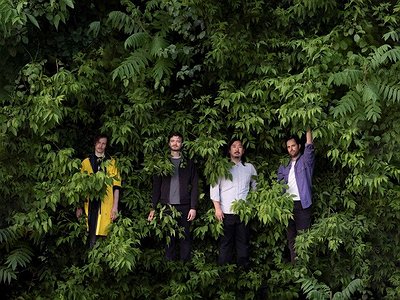Name: Absolutely Free
Members: Matt King, Michael Claxton, Moshe Fisher-Rozenberg
Nationality: Canadian
Occupation: Vocalist, multi-instrumentalist (Matt King), Bassist, synthesizer player (Michael Claxton), Drummer, synthesizer player (Moshe Fisher-Rozenberg)
Current release: Absolutely Free's latest single "Interface" is out now via Boiled. Their new full-length album Aftertouch will follow on September 24th.
If these thoughts by Absolutely Free piqued your interest, visit them on Facebook, Instagram, twitter, and bandcamp.
Where does the impulse to create something come from for you? What role do often-quoted sources of inspiration like dreams, other forms of art, personal relationships, politics etc play?
We've been playing music for so long, that it's become synonymous with living.
In the past few years, I think we've become more self-aware of our privileges and are trying to embrace opportunities to improve our communities.
“Remaining Light” is an example of trying to use our voices to create dialogue around socio-political issues. We're also very mindful of who we collaborate with or work with, and try to be aware of who's not being heard.
Is there a preparation phase for your process? Do you require your tools to be laid out in a particular way, for example, do you need to do 'research' or create 'early versions'?
Our process is a constant cycle of creation, destruction, rebirth, etc....
Do you have certain rituals to get you into the right mindset for creating? What role do certain foods or stimulants like coffee, lighting, scents, exercise or reading poetry play?
I always ride my bike to rehearsal. The trip puts me in a good frame of mind, helping to let go of the particular anxieties of said day.
What makes lyrics good in your opinion? What are your own ambitions and challenges in this regard?
I like lyrics that are poetic and well-crafted, lyrics that use words and language in ways that are evocative. I especially love when lyrics are both light and heavy.
I always labour over lyrics extensively, and find that I can't convince myself to commit to words that I find personally meaningless.
Once you've started, how does the work gradually emerge?
The biggest shift in writing this album was that we spent all of our time listening, as opposed to performing. It was freeing to imagine composing music that was not dependent on us being physically able to perform it, but also overwhelming in its infinite options and endless adjustments.
Once a piece is finished, how important is it for you to let it lie and evaluate it later on? How much improvement and refinement do you personally allow until you're satisfied with a piece? What does this process look like in practise?
It's definitely a challenge for us to commit to finality.
One really fun workaround to this is that we've been sending MIDI versions of “How To Paint Clouds” around to other musicians and asked them to create new instrumentations with the files. Sometimes the songs sound like nothing we would've expected or hold an uncanny familiarity, but so far all the results have been incredible in really strange ways.
After finishing a piece or album and releasing something into the world, there can be a sense of emptiness. Can you relate to this – and how do you return to the state of creativity after experiencing it?
This album was such a long labour and part of a conscious approach to not rush the process. Because of this, I think we're already itching to start on something new.
I've also personally found so much enjoyment thinking about the expansive multimedia projects that are accompanying the album. My experience of writing music is often more intuitive than it is critical or responsive, so I've enjoyed using a different part of my brain to develop or collaborate on creative visual artworks.




